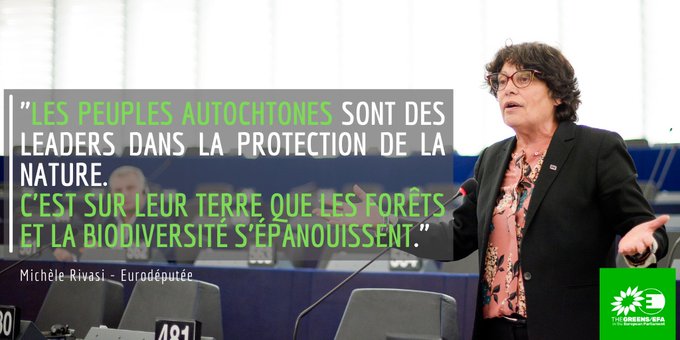4 October 2021. European Parliament Plenary in Strasbourg, MEPs debated and voted on the report on the role of development policy in the response to biodiversity loss in developing countries. (23 p)
- streaming @ 5pm https://multimedia.europarl.europa.eu/en/plenary-session_20211004-0900-PLENARY_vd
- The role of development policy in the response to biodiversity loss in developing countries: closing statements by Jutta URPILAINEN, European Commissioner for International Partnerships and by Michèle RIVASI (Greens/EFA, FR), Rapporteur
The EU Biodiversity Strategy aims to achieve a situation in which all of the world’s ecosystems have been restored, resilient and adequately protected by 2050, in line with the 2030 Agenda for Sustainable Development, and expresses commitment to the objective of ending human-induced extinction of species by 2050, guided by intergenerational responsibility and the principle of equality, including respect for the rights, and the full and effective participation of IPLC;
The strategy of the EU and its Member States in support of developing countries should be designed to anticipate the effects of climate change and biodiversity loss.
According to the IPBES 2019 global assessment report on biodiversity and
ecosystem services, most of the Aichi Biodiversity Targets for 2020 have been missed. The World Economic Forum’s Global Risks Report 2020 identified
environmental risks as the greatest systemic risks to our global economy. The OECD estimates at USD 500 billion per year the financial flows potentially
harmful to biodiversity (based on fossil fuel and agricultural subsidies), an order of
magnitude ten times higher than global finance flows for biodiversity conservation and
sustainable use, and whereas the costs of inaction on biodiversity loss are high and are
anticipated to increase. IPBES reports that land use change, agricultural expansion and urbanisation are
responsible for more than 30 % of emerging disease events. (page 6)
The UN Food and Agriculture Organization (FAO) estimates that about 75 % of
genetic diversity in plants has been lost worldwide, while 75 % of the world’s food is
now generated from only 12 plants and five animal species, which poses a serious risk
to global food security. (page 8)
- Planning, scrutinising and monitoring of the NDICI-Global Europe are key to the pursuit of the EU’s global biodiversity goals.
- The NDICI-Global Europe should contribute to the ambition of providing 7.5 % of annual spending under the MFF to biodiversity objectives in the year 2024 and 10 % of annual spending under the MFF to biodiversity objectives from 2026 onwards.
- The effective application of the ‘do no significant harm’ principle across EU spending and programmes; calls for the enhancement of the reporting and monitoring framework of EU external biodiversity policy, inter alia through detailed provisions on biodiversity objectives and indicators; calls, more broadly, for the EU and its Member States to promote research and innovation on biodiversity conservation and protection, and agro-ecological solutions for delivering key development benefits, thereby helping to implement the SDGs. (page 11)
The EU external budget for supporting biodiversity policy remains
considerably low in comparison with that earmarked for climate change policies.
- This calls for: an effective increase in funds for biodiversity protection, in line with the MFF agreement, and for technical assistance for the development of further resource mobilisation tools in order to respond to global commitments on biodiversity;
- stresses the need to track, report and phase out environmentally harmful subsidies, and to channel them towards biodiversity-friendly activities, in line with Agenda 2030 and the relevant international Conventions and obligations;
- calls for a significant share of EU official development assistance dedicated to climate action to be directed towards supporting biodiversity conservation co-benefits in climate mitigation and adaptation


No comments:
Post a Comment